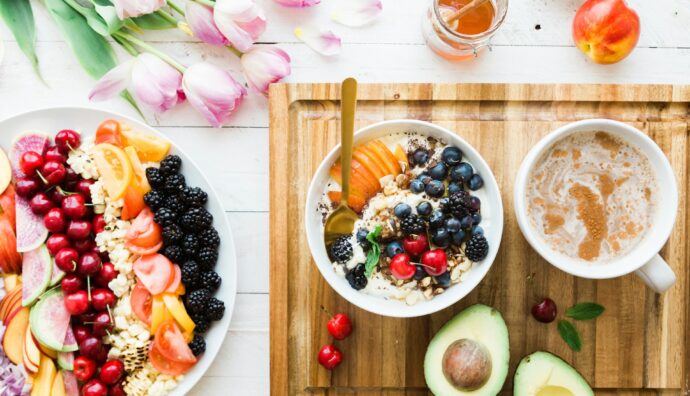This week we host a contribution from Dr. Alice Viani, Dietitian and specialist in Sports Nutrition. In her job, she deals with nutrition, especially in combat sports, evaluating not only the aspect of weight control, but also the psychological impacts. Athletes are followed on their path towards a healthy and correct diet where a balanced diet becomes an integral part of the athletic training programme. She was in charge of a training session for FIJLKAM entitled “Nutrition and integration in Martial Arts”.
For us it is essential to offer useful…food for thought to make the most of the discipline we practice and we believe that the topic of nutrition in Aikido needs a qualified point of view. Enjoy the reading!
“Way of Harmony and Energy”
Those who choose Aikido choose to embrace a discipline that brings with it a commitment that goes beyond simple physical training. It’s not just about perfecting the techniques on the tatami, rather adopting a lifestyle (or a diet – δίαιτα, understood as a lifestyle) that supports not only the body and the physiological needs of the organism, but also the mind and interpersonal relationships.
Aikido is distinguished from other martial arts by its lack of competitive purposes and does not require mandatory “categorization” into weight classes, yet it is reductive to consider it only and exclusively as a “moral art”.
On the tatami complex techniques are experimented including direct and circular attacks, from which one can defend oneself both with bare hands and with Tanto (wooden knife), Jo (staff) and Bokken (wooden sword), levers, projections. Together with learning how to safely fall (ukemi), all this makes Aikido an aerobic activity, an excellent cardiovascular training suitable for all levels of physical activity.
Aikido is a situational sport that goes beyond the mere execution of techniques: training requires excellent physical preparation, which includes strength, resistance, muscular elasticity, mobility and joint flexibility and a very high neuropsychic activity (coordination and speed of reaction). This is why correct nutrition becomes a crucial element for Aikidoka.
A balanced diet is not simply a question of discipline, but is an ally to training itself, providing the body with the necessary energy before training and contributing to the restoration of reserves after physical activity, without compromising concentration and focus. The balanced intake of the three main macronutrients -carbohydrates, proteins and fats- is essential to support the body without weighing it down.
The nutrition of an Aikidoka, depending on the sporting commitment, does not differ from that of a person who carries out a fitness activity and must always be personalized taking into consideration not only the activity in the gym, but also the organization of the time outside the Dojo, gender, age and general clinical-physical conditions.
What we eat provides not only energy, but also vital substances for our physical and mental well-being.
Energy needs, as mentioned, vary based on physical activity and body weight, but in general for Aikido practiced two or three times a week, an intake of approximately 25-35 kcal per kg of body weight per day is recommended. Insufficient energy intake can lead to weight loss, injuries and reduced performance, phenomena that fall under REDS (Relative Energy Deficiency in Sport), a threat that must be recognized and prevented.
In sports nutrition, the calculation of the intake of the main macronutrients as a percentage of the daily energy requirement has been abandoned, but it is suggested to determine this requirement in grams per kilo of body weight (g / kg BW / day).
In fitness performed 2/3 times a week, alongside a sedentary lifestyle (e.g. office work), the following may be considered sufficient: 3-5 g of carbohydrates per kg of body weight per day, 0.8 – 1.8 g of proteins per kg of body weight per day day and 0.5 – 1 g of lipids/kg BW/day, with particular attention to limiting the intake of saturated fats and cholesterol.
It is important to integrate foods rich in vitamins, minerals and fiber into your diet, such as fruit, vegetables and whole grains, as well as proteins from selected sources such as white meat, lean fish and legumes (vegetable proteins).
Water plays a fundamental role in hydrating the body, especially during physical activity, when even slight dehydration can compromise performance (reducing the duration and intensity of muscular effort) and increase the risk of muscle cramps. In particular, for athletes, we recommend an intake of 1.5 ml/kcal of energy expenditure, which can be calculated as a higher requirement than the classic 30 ml per kg of body weight per day of a sedentary adult (even reaching 40-50 ml/kg b.w.). In sport the hydration must be present regardless of the sense of thirst.
In conclusion, the path to optimal nutrition for Aikidoka, and in general for anyone trying to maintain a healthy and balanced lifestyle, does not require extravagant diets or complicated regimes. The solution lies rather in the adoption of simple and healthy nutrition habits, based on genuine foods and quality raw materials, prepared with attention and method. It is true that it may take a little more time to prepare fresh meals rather than opting for pre-packaged products and it may be necessary to educate younger people (but not only) about a more conscious diet, weaning them from the often unhealthy foods that they find easily through supermarkets, vending machines or friends. However, these efforts are crucial to ensuring a healthier future and, with a little organization, will become an integral part of your daily routine.
In this way, not only is maximum commitment supported on the tatami, but the physical and mental well-being necessary to face daily challenges with balance and harmony is promoted.
Disclaimer: Picture by Brooke Lark from Unsplash

